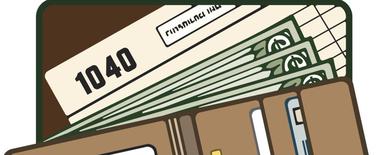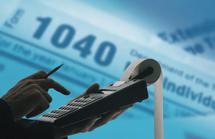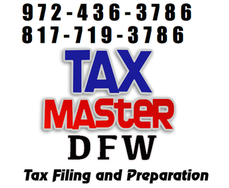Tax Preparation Blog
Will You Make The 49 Cent Mistake This Tax Season?
by Tax Master DFW on 10/14/14
Title:
Will You Make The 49 Cent Mistake This Tax Season?
Word Count:
852
Summary:
When it comes to filing your tax return, spending 49 cents could be the biggest mistake you ever make.
Millions of taxpayers make the mistake of putting their income tax return in a regular letter-sized envelope, sticking on a 49 cent stamp, and placing the envelope in the mailbox.
And millions of taxpayers "get away" with this mistake year after year.
Why do I say that putting your tax return in the mailbox is a mistake? Let me explain.
Every year, a small perce...
Keywords:
#Arlington_Tax_Preparation, #Tax_Preparation, #Tx_Tax_prep, #Texas_Tax_Preparation, #Arlington_Tax_Prep, #Arlington_TX, #Tax_Prep, #DFW_Tax_Prep, #Tax_Filing, #Taxes, #Lewisville_Tax_Prep, #Lewisville_Tax_Preparation, #DFW_Tax_Preparation, #Arlington, #Tarrant_County, #Reduce_Taxes, #Tax_Refunds, #Pay_Taxes, #Tax_Help, #Bookkeeping, #DFW_Bookkeeping, #Investing, #tax_bookkeeping, #DFW, #Texas, #North_Texas, #Filing_Taxes, #1099, #W-2, #W-4
Article Body:
When it comes to filing your tax return, spending 49 cents could be the biggest mistake you ever make.
Millions of taxpayers make the mistake of putting their income tax return in a regular letter-sized envelope, sticking on a 49 cent stamp, and placing the envelope in the mailbox.
And millions of taxpayers "get away" with this mistake year after year.
Why do I say that putting your tax return in the mailbox is a mistake? Let me explain.
Every year, a small percentage of mail doesn't get delivered. The U.S. Postal Service doesn't like to admit this, but it's true.
Furthermore, even if your tax return gets delivered to the IRS, every year a small percentage of tax returns get lost by the IRS.
Don't believe me? I'll never forget the day one of my clients showed me a letter he received from the IRS:
"We regret to inform you that we received your return.... but have lost it."
Believe it or not, this actually happened!
So my question to you is this: What are you doing to do if this happens to you?
If your tax return doesn't get delivered, or if it gets delivered but is subsequently lost inside the mammoth IRS, what are you going to do to prove that you actually mailed the return?
Just calling the IRS and saying, "Well, I mailed it on time. I know I did!" isn't going to prove anything. And the burden to prove you mailed the return on time will rest on your shoulders.
You have two ways to solve this potentially dangerous problem:
OPTION #1: File your return electronically.
There are many benefits to e-filing:
-- Accuracy. In order for a return to get e-filed it must pass several strict accuracy tests, thereby significantly reducing the chance of human error. E-filed returns are subject to this level of scrutiny at the point of origination.
-- Security. The filer creates his own electronic signature, resulting in a truly paperless experience.
-- Speed. If you're due a refund, it can take 6-8 weeks with a paper return. Combined with direct deposit, your e-filed return will generate a refund in as little as 10 days.
-- Proof of acceptance. This is the benefit I want you to focus on right now. When you e-file your return, you receive an electronic acknowledgement within 48 hours that the IRS has accepted your return.
Bingo! Now you have proof positive that the return was filed. 'Nuff said?
E-filing is rapidly becoming the filing method of choice. But the majority of returns are still filed on paper, so here's a second way to avoid the "missing return" dilemma.
OPTION #2: If you're a "paper filer", go to the post office and spend a measly $5.05 to send the letter via Certified Mail, Return Receipt Requested.
Doing this will accomplish two very important things:
1. Certified Mail (which costs $3.40) provides the proof that the return was mailed, and that it was mailed on time, on or before the due date.
According to the IRS, a paper return is filed on time if it is mailed in an envelope that is properly addressed and postmarked by the due date. When you use Certified Mail, you will get a receipt postmarked by the postal employee, and the date on the receipt is the postmark date.
So, should the return get lost by the IRS, or if the IRS questions whether you mailed it on time, you will have written proof.
Plus, every piece of Certified Mail is assigned a tracking number which can then be traced by the U.S. Postal Service should a problem arise.
2. Return Receipt provides another level of insurance. For an extra $2.85, when the letter is delivered, the IRS must sign or stamp a receipt that documents the date of delivery. This receipt then gets mailed back to you, so you now have the written proof that the IRS received it.
Technically, you only need to send the return via Certified Mail to prove that it was mailed on time. But I really like the Return Receipt as well -- it gives you that extra "peace of mind" to know that the IRS received it. And you'll know exactly what day it was received. This is the proof of delivery.
So don't run the risk of having your tax return get lost in the mail. And don't run the risk of having your tax return get lost in the piles and piles of paper that flood the IRS each year.
Think about it. Well over 100 million personal income tax returns are filed with the IRS every year, and the majority of them are still prepared on paper and mailed by the U.S. Postal Service.
The U.S. Postal Service and the IRS are staffed by hard-working people who are only human. People make mistakes. To greatly reduce the chance of a mistake being made with your return, don't you make the mistake of just putting your tax return in the mailbox.
Instead, e-file it, or take it to the post office and send it Certified Mail, Return Receipt Requested. It could be the best $5.25 you ever spent!
What Does It Take To Pay Zero Taxes?
by Tax Master DFW on 10/13/14
Title:
What Does It Take To Pay Zero Taxes?
Word Count:
737
Summary:
How many times have you heard someone say, "I don't pay any taxes. My accountant takes real good care of me . . . I haven't paid a dime in taxes in years."
Does that outrageous statement sound familiar?
Maybe it's your brother-in-law, or a fellow Soccer Mom, or a co-worker at the office.
And so you think to yourself, "What am I doing wrong? How come I'm paying taxes and so-and-so says he/she pays nothing? How do they do it!"
Is it really possible to pay "zero taxe...
Keywords:
#Arlington_Tax_Preparation, #Tax_Preparation, #Tx_Tax_prep, #Texas_Tax_Preparation, #Arlington_Tax_Prep, #Arlington_TX, #Tax_Prep, #DFW_Tax_Prep, #Tax_Filing, #Taxes, #Lewisville_Tax_Prep, #Lewisville_Tax_Preparation, #DFW_Tax_Preparation, #Arlington, #Tarrant_County, #Reduce_Taxes, #Tax_Refunds, #Pay_Taxes, #Tax_Help, #Bookkeeping, #DFW_Bookkeeping, #Investing, #tax_bookkeeping, #DFW, #Texas, #North_Texas, #Filing_Taxes, #1099, #W-2, #W-4
Article Body:
How many times have you heard someone say, "I don't pay any taxes. My accountant takes real good care of me . . . I haven't paid a dime in taxes in years."
Does that outrageous statement sound familiar?
Maybe it's your brother-in-law, or a fellow Soccer Mom, or a co-worker at the office.
And so you think to yourself, "What am I doing wrong? How come I'm paying taxes and so-and-so says he/she pays nothing? How do they do it!"
Is it really possible to pay "zero taxes"?
For purposes of this article, let's give your "no-tax" friend or relative a name. Let's call him "Charlie" (or if he is a she, just think "Charlene").
OK, what is Charlie up to? What's his secret?
Charlie has no secret. He's not doing anything that you should be doing. Do not be envious of Charlie, and here's why . . .
I can think of at least five reasons you should ignore whatever Charlie says about his "no-tax" situation.
REASON #1: Charlie is a liar. Every family has one, so don't feel bad. Let's face it, some people just like to indulge in fabrications to make themselves feel good. Charlie is telling you a big fat lie because Charlie has "issues." 'Nuff said?
REASON #2: Charlie is pond scum. OK, hear me out on this one. I don't mean to offend you if Charlie is a close and dear relative, or your best friend, but I'm going to give it to you straight: Charlie cheats on his tax return, and he cheats big time. There are plenty of folks out there like Charlie. He's one of the reasons that you and I pay so much in taxes -- he doesn't report all his income, and he deducts bogus expenses by the thousands.
He and his accountant may even be in cahoots on this. Charlie brings in his records and his accountant crunches the numbers, then calls Charlie and says, "You owe $5,000." So Charlie rummages around in his files and somehow manages to come up with another batch of expenses that miraculously
reduce his balance due to zero. It's like magic!
End result: Charlie's tax return is a big lie.
Charlie is a thief. Charlie should be put in jail for the tens of thousands in taxes he has illegally withheld from the government over the years.
REASON #3: Charlie is stupid. Again, I'm sorry if I'm being too hard on Charlie. But some people are so clueless about taxes that if they have no balance due on their return, or if they are getting a refund, they mistakenly believe they didn't pay any tax that year.
And believe it or not, this is actually a very common misconception that thousands of people cling to. Ah, to be so blissfully ignorant!
I hope you are not so naive to think that the "bottom line" on your tax return tells the whole story about your tax liability. It doesn't.
REASON #4: Charlie is broke. Charlie may actually pay zero taxes because --are you ready for this one? -- Charlie doesn't make any money!
Charlie owns a small business or works full-time at his self-employment activity, and Charlie may rake in hundreds of thousands in income from sales of his product or service -- but Charlie's business spends more than it brings in, and Charlie's business has a loss every year.
So Charlie doesn't really have a tax problem. Instead Charlie has any number of other problems. He has a marketing problem, or a management problem, or a personnel problem. Charlie's business is failing, and paying zero taxes is just a symptom of a business that will eventually close.
REASON #5: Charlie is just scraping by. Charlie's business may not be losing money every year, but it's not really making much either. He has a small profit -- enough to keep him busy. His business may even "look" profitable, but it's really the classic shoestring operation.
So now, I ask you, do you really want to pay zero taxes? People who don't pay taxes are usually in one of these five categories: Chronic Liars, Pond Scum, Stupid, Broke, or Just Scraping By.
The purpose of business is to be profitable.
The unavoidable result of a profitable business is taxes. And yes, you should do everything legally possible to reduce those taxes. But if you are going to be successful, you are going to pay some taxes.
When it comes to taxes, stay away from Charlie.
Your Auction Business & Taxes
by Tax Master DFW on 10/13/14
Title:
Your Auction Business & Taxes
Word Count:
425
Summary:
Taxes is an issue when running an Auction Business. But is there a grey line when it comes to declaring it?
It's really within reason if you're going to do a huge amount of it, a small amount is negligible.
Some people want to have a small business for write-offs, you might want to consider taking it to the next level and be able to write off some of your expenses like your computer, office space, supplies, etc.
Each state and each province has their own amount of sa...
Keywords:
#Arlington_Tax_Preparation, #Tax_Preparation, #Tx_Tax_prep, #Texas_Tax_Preparation, #Arlington_Tax_Prep, #Arlington_TX, #Tax_Prep, #DFW_Tax_Prep, #Tax_Filing, #Taxes, #Lewisville_Tax_Prep, #Lewisville_Tax_Preparation, #DFW_Tax_Preparation, #Arlington, #Tarrant_County, #Reduce_Taxes, #Tax_Refunds, #Pay_Taxes, #Tax_Help, #Bookkeeping, #DFW_Bookkeeping, #Investing, #tax_bookkeeping, #DFW, #Texas, #North_Texas, #Filing_Taxes, #1099, #W-2, #W-4
Article Body:
Taxes is an issue when running an Auction Business. But is there a grey line when it comes to declaring it?
It's really within reason if you're going to do a huge amount of it, a small amount is negligible.
Some people want to have a small business for write-offs, you might want to consider taking it to the next level and be able to write off some of your expenses like your computer, office space, supplies, etc.
Each state and each province has their own amount of sales you can do without declaring, & charging taxes. Check with your state to see what amount you have to do before you start taking taxes.
The BC government (where I live) gives you an allowance of $30,000 before you have to charge for sales tax, that's for someone who legally has a business.
There's definite advantages of having a business license, declaring your income and being able to have write-offs. That being said, legally you have to declare taxes if you're profiting from it.
Are You Holding Onto Too Much Product?
We all love to make money but after a while when you get too much product built up, you can start losing money. Why would we do that?
What happens is we get in a mindset on the value we feel our items are worth verses, what we can get for them. That's why when purchasing items it's important to keep in mind that you make money when you buy, Not - When you Sell.
But we also get into the territory where you feel you should get a certain price for something. And that's what we need to shake.... immediately.
You need to be watching your products and if something isn't pulling in the money anymore, you need to blow it out. Product on the shelves is not money in your pocket.... it's out of your pocket.
When we relate this to your eBay business, the same goes for what you have in your eBay store. Keep it fresh and alive. Have special offers, only for those who are buying an auction AND a store item.
Make it something that they want and give them a deal. Blowout product that you've had for too long. This will give you money up right away and gets you product you can actually do well with.
So, get out of the mind frame that to you need to make "X" amount from certain products, if they're not pulling it in, then "X" them out and move onto newer hotter products!
Your Kids Can Reduce Your Taxes And Get Rich
by Tax Master DFW on 10/13/14
Title:
Your Kids Can Reduce Your Taxes And Get Rich
Word Count:
261
Summary:
One often-overlooked tax benefit for business owners is putting their kids to work in their business.
Keywords:
#Arlington_Tax_Preparation, #Tax_Preparation, #Tx_Tax_prep, #Texas_Tax_Preparation, #Arlington_Tax_Prep, #Arlington_TX, #Tax_Prep, #DFW_Tax_Prep, #Tax_Filing, #Taxes, #Lewisville_Tax_Prep, #Lewisville_Tax_Preparation, #DFW_Tax_Preparation, #Arlington, #Tarrant_County, #Reduce_Taxes, #Tax_Refunds, #Pay_Taxes, #Tax_Help, #Bookkeeping, #DFW_Bookkeeping, #Investing, #tax_bookkeeping, #DFW, #Texas, #North_Texas, #Filing_Taxes, #1099, #W-2, #W-4
Article Body:
One often-overlooked tax benefit for business owners is putting their kids to work in their business.
If you are self-employed you can take advantage of this by paying your kids $4,000 each for performing services in your business. The business gets a tax deduction for the compensation and that saves taxes on the parent's tax return. Also, there is no Social Security or Medicare Taxes due on the wages you pay to your child.
The next step is to open a Roth IRA for the child and contribute the $4000 to the IRA. The child may not withdraw this money until age 59 ?. The earnings and the amounts contributed grow tax-free and are generally never subject to tax when withdrawn. On the child's tax return, the child gets no tax deduction for the IRA but the child may not pay tax on the $4000if he or she is at a low enough level of income.
If you do this for 10 years, from age 8 to 18, and the IRA earns an 8% return each year, your child should have around $1.5 million at age 60 and that should grow to over $2 million by age 64.
If you plan to do this, consult with a professional tax advisor first and be sure your children are actually performing services for your business. Also, check that the work is not violating any child labor laws.
The information contained herein is not intended as tax advice. To comply with requirements imposed by the IRS, any information contained in this communication cannot be used for the purpose of avoiding penalties under the Internal Revenue Code. Call us for professional and specific advice for you and your family.
The Skinny on 1031 Exchange: Maximizing Profits by Minimizing your Tax Liability
by Tax Master DFW on 10/12/14
Title:
The Skinny on 1031 Exchange: Maximizing Profits by Minimizing your Tax Liability
Word Count:
528
Summary:
A 1031 exchange refers to Section 1.1031 of the Internal Revenue Code which was passed in 1990. Normally, when you sell all real and personal property, the tax code requires the payment of the Capital Gains Tax.
Keywords:
#Arlington_Tax_Preparation, #Tax_Preparation, #Tx_Tax_prep, #Texas_Tax_Preparation, #Arlington_Tax_Prep, #Arlington_TX, #Tax_Prep, #DFW_Tax_Prep, #Tax_Filing, #Taxes, #Lewisville_Tax_Prep, #Lewisville_Tax_Preparation, #DFW_Tax_Preparation, #Arlington, #Tarrant_County, #Reduce_Taxes, #Tax_Refunds, #Pay_Taxes, #Tax_Help, #Bookkeeping, #DFW_Bookkeeping, #Investing, #tax_bookkeeping, #DFW, #Texas, #North_Texas, #Filing_Taxes, #1099, #W-2, #W-4
Article Body:
A 1031 exchange refers to Section 1.1031 of the Internal Revenue Code which was passed in 1990. Normally, when you sell all real and personal property, the tax code requires the payment of the Capital Gains Tax. That is to say, when you sell your office for $100,000 more than you bought it for, you must pay the gains upon those earnings. However, after the passing of a 1031 Exchange that is no longer necessarily the case.
What types of Property Qualify?
A 1031 Exchange allows sellers of some real and personal property the opportunity to avoid paying capital gains taxes (which are 15% plus state taxes) by ‘exchanging’ their sold property for newly purchased property. However, certain restrictions apply. The most important restriction is that only business property and investment property applies. So, an exchange under a purely residential home does not qualify, whereas exchanging a property that your business has used for its office, or even one used simply for investment diversification does.
But simply selling your office is not enough to qualify you for a 1031 exchange. Rather, the code also requires that that you simultaneously buy a property of ‘like-kind.’ This does not mean that if you are selling a 2000 sq. ft. office you must buy a 2000 sq. ft office. Rather, the term is interpreted very loosely to mean virtually any real estate held for productive use in a business or for investment, whether improved or unimproved can be exchanged for any other property to be used for productive business or investment purposes. So, if you sell and unimproved lot of land and purchase an improved one or visa versa, this still qualifies, just as selling industrial property and buying rental resort property does. The point here is that while ‘like-kind’ is an important restriction, it has been interpreted so broadly as to give individuals a lot of free reign.
The Exchange
When most owners envision a 1031 exchange they envision a provision whereby they must buy and sell the two properties on the same week or even the same day. But that is not the case. A tax-deferred 1031 exchange allows up to 180 calendar days between the sale of the first property and the purchase of the second. But no matter the time between sale and purchase, a 1031 exchange is required by the Internal Revenue code to have a ‘qualified intermediary’ to manage the exchange.
A Qualified Intermediary
The requirement of a qualified intermediary is intended primarily to prevent individuals engaged in the exchange from using the time in between the sale and purchase of property to their financial gain. Although the seller has up to 45 days to set up the intermediary, the exchange is designed so that the seller should not profit from the use of the money before the purchase of the new property is made. An intermediary serves the judicial purpose of ensuring this. But it is important to remember that the qualified intermediary charges fee for this. While these services can vary in cost depending on the additional advisory services provided by the Intermediary, individuals interested in a 1031 exchange should expect to pay somewhere in the vicinity of $500 to $700 for the first exchange and $200 to $400 for each additional property.








